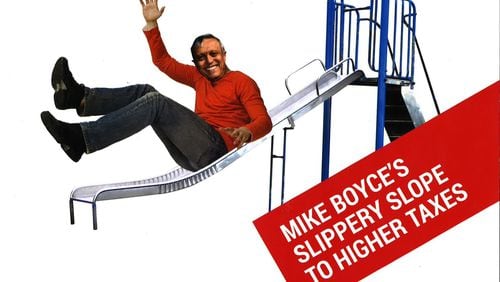A campaign glossary
The landscape for campaign giving and spending changed after a key Supreme Court ruling in 2010. Here’s a glossary of political fundraising groups and the rules they must follow:
Social-welfare organizations: Do not have to report specific donors so long as at least 51 percent of their money is spent on social-welfare pursuits. They can receive unlimited contributions and provide unlimited donations to political committees, but are not permitted to coordinate with those committees. They report broad categories of spending to the IRS.
Independent political committees: Can accept unlimited amounts of donations and spend unlimited amounts of money to advocate for or against an issue or candidate. They are not permitted to coordinate with any campaign and must report the contributions and spending on state campaign finance reports.
Candidate campaigns (local races): Can raise unlimited funds with the following individual donation limits – $2,600 for primary elections; $1,400 for primary runoff; $2,600 for general election; $1,400 for general runoff. Must report contributions and expenditures on state campaign finance reports.
Political Action Committees: Must report their fundraising and spending with the Federal Elections Commission. Contribution limits are $5,000 to a candidate committee per election; $15,000 annually to any national party committee; and up to $5,000 annually to any other PAC. They can receive up to $5,000 from any individual, PAC or party committee in any calendar year.
Super PACs: Must file regular financial reports with the FEC and can make no contributions to candidates or parties. They can make independent expenditures advocating the election or defeat of a specific candidate. There are no limits or restrictions on the sources of funds that may be used for these expenditures.
Tim Lee’s contentious battle to retain his job as chairman of the Cobb County Commission attracted more than $143,000 in secret money that was used in a failed attempt to influence voters and keep him in office, an Atlanta Journal-Constitution analysis has found.
The so-called dark money came from a non-profit social-welfare organization that is not required to disclose its donor list, meaning voters had no way of knowing who was behind the positive messages about the chairman and the negative advertising about his opponent, retired Marine Col. Mike Boyce.
While instances of undisclosed donations are still rare in Georgia’s county politics, dark money is playing a greater role in state and local elections — where it has more power to mislead voters or malign opponents because of the lower overall levels of fundraising in those races, experts say.
The 2016 Cobb primary illustrates how anonymous political contributions, which have become the norm in national politics, can be converted into campaign spending in a local election.
The dark money spent on Lee's behalf came from the non-profit Revitalize America Fund, which wrote checks to an independent political committee called Cobb First. The political committee then spent heavily trying to help Lee win re-election — from FOX News television commercials touting the chairman's conservatism to direct mail attack pieces against Boyce.
Revitalize America Fund also paid for two glossy mailers that incorrectly claimed Lee cut county-wide property taxes in each of the last three years. They stopped just short of asking voters to cast ballots for him: “Call your county commissioner and tell them to vote for Tim Lee’s 4th tax cut in 4 years.”
It’s unknown how much the mailers and postage cost, since the social-welfare organization paid for it.
Formed in January 2015, Revitalize America Fund is led by Ben Mathis, a Marietta attorney with longstanding ties to Lee. In 2014, Mathis defended Lee before the county ethics commission when the chairman was accused of improperly hiring an outside attorney to negotiate a stadium agreement with the Braves. He also was part of a small group of private advisers that Lee called his "Kitchen Cabinet."
As an independent political committee, Cobb First was required to report its fundraising to the state. But Revitalize America Fund is under no legal obligation to say from where its money came, so long as a majority is spent on "social welfare," defined by the IRS as furthering "the common good and general welfare of the community."
Mathis said he does not speak to the media about the fund's operations, and referred all questions to Stefan Passantino, an attorney who specializes in campaign finance law and helped incorporate it.
“As a … social welfare organization, Revitalize America Fund exists to promote fiscal responsibility at all levels of government,” Passantino wrote in an email to the AJC. “Revitalize America Fund made contributions to Cobb First because it knew Cobb First was generally supporting Chairman Lee, and because (Cobb First and Lee) shared values consistent with Revitalize America Fund’s goals.”
Passantino also said Revitalize America Fund “never specifically earmarked or specified how Cobb First should spend the funds it received.”
The Atlanta Journal-Constitution was able to identify one contributor to the fund, construction giant C.W. Matthews Co., which voluntarily reported $20,000 in donations on its campaign disclosure. Since 2014, the county has paid the company more than $65 million for construction work on 29 projects.
Executive Vice President Michael Bell said the contribution was to support the fund’s goals, and that his company “has never had any input into the organization’s particular expenditures.”
Lee did not return messages seeking comment. Brian Robinson, former communications director for Gov. Nathan Deal who worked as a consultant on Lee's campaign before the July 26 runoff, also declined to answer questions.
“This isn’t a client matter for me at this juncture,” Robinson said.
Dark money supported mailers, TV ads
The Cobb Republican primary featured Lee, Boyce and retired businessman Larry Savage, whose presence in the race all but ensured a runoff.
Cobb First incorporated April 28, just a few weeks before the May 24 general primary, and received a $60,000 check from Revitalize America Fund on May 6.
Four days later, Cobb First wrote a check for $25,660 to cover the television commercials that promoted Lee’s re-election. Other payments from Revitalize America Fund followed: $23,000 on June 27; $20,000 on July 5; $20,000 on July 11; and another $20,000 on July 19.
The committee received only three other donations, the largest a $5,000 contribution from Pope & Land Enterprises, one of the principal developers building the Braves $550 million mixed-use complex. The lion's share, 94 percent, came from Revitalize American Fund.
Political consultant and former lobbyist Chip Lake founded Cobb First. Lake has for years shared a Marietta office with Heath Garrett, whose company is the county's $14,000-per-month lobbyist.
Lake said Cobb First used all of its money in support of Lee. In addition to television commercials, the money bought ads in the Marietta newspaper, phone calls to voters and at least two mailers attacking Boyce: "Mike wants higher property taxes! Mike loves increased gas taxes! Mike is a committed progressive!"
Another announced: "Warning: Con job in Cobb County. Don't fall for Slippery Mike Boyce's latest con job."
“We were happy to have Revitalize America Fund as an investor in Cobb First, and we reported their contributions in accordance with state law,” Lake wrote in an email. “Even though we came up short, I am proud to have supported the effort to re-elect Tim Lee. His legacy will be one that we can be proud of.”
Dark money growing in local politics
Dark money has flooded presidential and congressional races since2010, following a U.S. Supreme Court ruling in the Citizens United case that allowed issue advocacy groups to spend money in political campaigns.
A study published last month by New York University's Brennan Center For Justice found dark money's influence is growing in local politics, too. In a study of six states, not including Georgia, Brennan found a 38-percent increase of dark money in local and state races since 2004.
The study’s authors said dark money poses “special dangers” at the state and local levels because “sources often harbour a narrow, direct economic interest” in the result.
“In relatively low-cost elections … it is easy for dark money to dominate with unaccountable messages that voters cannot meaningfully evaluate,” the authors wrote.
Dark money is popular with corporations and individuals who don't want to be associated with a controversial issue or unpopular candidate, said University of Georgia Political Science professor Charles Bullock.
“It’s the way to go if you don’t want your name attached to something,” Bullock said.
Michael Kang, an Emory law professor who has written about election law, said the problem with dark money is that it makes credibility judgments more difficult for voters.
The organizations must report broad categories of spending to the IRS, he said, but that isn’t “timely or helpful to people interested in disclosure.”
Lee's messaging suffered credibility issues even without voters knowing all the sources of money, said Kerwin Swint, chairman of Kennesaw State's Political Science Department.
The chairman's image was inextricable linked to Cobb's business establishment, even before he pushed through the $400 million public investment in SunTrust Park, which became the centerpiece of Boyce's grass-roots campaign. And Lee favored other controversial big-ticket projects, like the $500 million bus rapid transit proposal, that conflicted with many of the county's rank-and-file conservatives.
“You have to be a credible messenger, and a lot of people by this time didn’t think Tim Lee was,” Swint said. “Some of the personal things, the name calling … didn’t resonate.”
Lee’s challenger outspent nearly 4 to 1
Lee’s re-election bid was further bolstered with about $50,000 in spending from the National Association of Realtors, and $45,000 from a second independent political committee, which took big contributions from former Gov. Roy Barnes, and a partner in Mathis’ law firm.
And Lee’s campaign raised at least $500,000 this year alone, more than double the $200,000 raised by Boyce. All told, Lee and the groups supporting him outspent Boyce nearly four to one.
Some spending on Lee’s behalf remains a mystery.
A "Tax Hike Mike Boyce" website cropped up during the campaign but has since been taken down. There was "Tax Hike Mike" direct mail and dozens of Facebook ads, all referring back to the website. None of it carried disclosures about who paid for it.
Passantino, the attorney for Revitalize America Fund, said it had nothing to do with the Tax Hike Mike campaign.
All the money didn't help Lee, of course. In fact, it may have moved the needle against him — the chairman received fewer votes in the runoff than he did in the general primary, despite a slightly higher turnout in the runoff.
Boyce won with 64 percent. He takes office in January.
Savage spent $15,000 of mostly his own money, and won 10.5 percent of the vote in the general primary.
“The idea of dark money and things we usually associate with national-scale campaigns in this race is disturbing, and raises a lot of questions about what these people thought was so important about protecting their guy,” Savage said.
Boyce said his campaign didn’t track the negative ads because they decided early on to not respond. The chairman-elect said he thinks it ultimately hurt Lee because there was so much mail, and because it didn’t “reflect the values of the community.”
“We raised and spent exactly what we needed to win,” Boyce said. “That reflects the kind of government I want to run, and it reflects the kind of person I am.”








